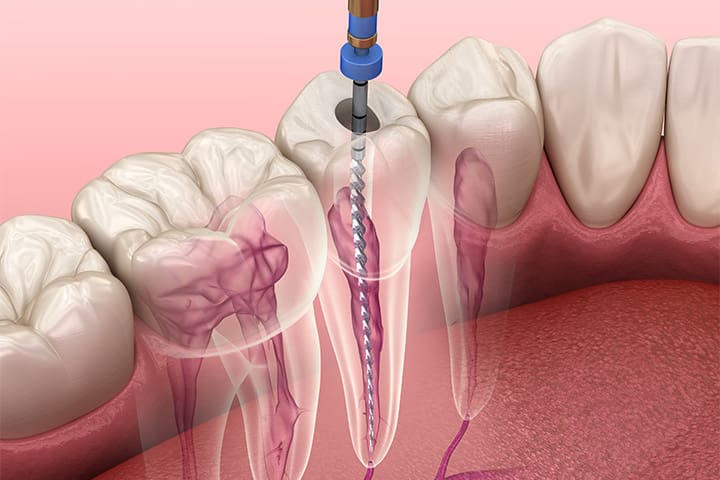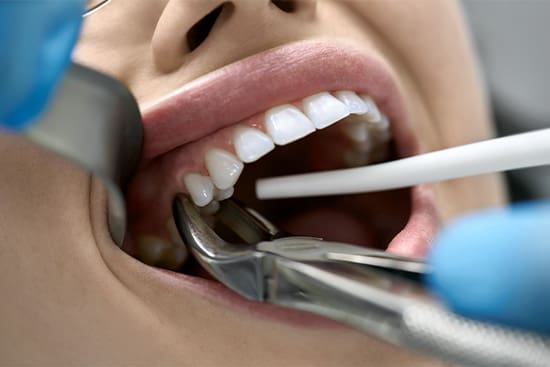A Solution for Infected, Painful Teeth

If one of your teeth has been in chronic pain for a while, it could be a sign that the pulp (the innermost layer of the tooth) has become infected. In this type of emergency dental situation, our experts at Waban Dental Group are likely to recommend a root canal treatment. Despite its reputation, this procedure is nothing to be afraid of; it will ultimately help put a stop to your pain and prevent the infection from spreading further! Call us today if you think a root canal treatment might be needed to save your tooth.
Why Choose Waban Dental Group for Root Canal Treatment?
- Experienced, Caring Dental Team
- 40 Years of Providing Excellent Dental Care
- Dental Emergency Hours Offered 7 Days a Week
Do You Need Root Canal Treatment?

There are several symptoms that can potentially indicate an infection of one of your teeth. Such warning signs include:
- A severe toothache that doesn’t go away.
- Sensitivity to hot or cold foods that lasts for a long time.
- Sharp pain that occurs when you bite down on something.
- A tooth that is significantly darker than normal.
- Red or swollen gum tissue.
- Pimple-like bump on the gum tissue near the tooth in question.
Bear in mind that the only way to know for sure whether you need a root canal treatment is to have an expert examine your smile. Please get in touch with us right away if you experience any symptoms that make you think that you may have an infected tooth.
The Root Canal Process

First, it’s important to note that many patients find that the root canal process is no worse than having a filling placed. This is because the very first step of the treatment is to numb your mouth with a local anesthetic, which will help you stay comfortable while you’re in the dental chair. You may feel some pressure, but you shouldn’t experience any discomfort beyond that.
To perform a root canal treatment, an opening must be created in the tooth. Then the infected pulp can be removed, and the inside of the tooth can be carefully sanitized. Once that’s done, the tooth can be filled with gutta-percha to help it maintain its shape. You can typically expect a dental crown to be placed in order to keep the tooth safe.
The Benefits of Getting a Root Canal

There are several reasons why root canal treatment is so highly recommended in cases where a tooth has become infected:
- The root canal treatment will help put a stop to the pain in your tooth, allowing you to use it normally again without issue.
- Getting rid of the infection can ultimately help you avoid more severe systemic health problems in the long run.
- You’ll be able to keep your natural tooth, meaning you don’t need to worry about the costs of having it removed and replaced.
Understanding the Cost of Root Canals

Even if you really need a root canal, you may worry it’ll be too expensive. The treatment can sound pricey given that it relies on specialized knowledge and tools. However, the cost of a root canal varies from patient to patient; you’ll only get a precise estimate by consulting our dentists. Our team will also make your care affordable, walking you through its price factors, dental insurance, and other relevant details. For more details, please keep reading or call us soon!
Factors That Can Affect Root Canal Cost

To confirm your root canal’s cost, we’ll first need to assess your tooth. Our team can then check factors that impact your treatment price, such as:
- Tooth Type/Location – A root canal’s price will partly depend on which tooth needs it. After all, some teeth have more roots than others. Treating those with extra ones involves a higher cost.
- Treatment’s Complexity – Root canals become more expensive as their complexity increases. The trickier they are to perform, the higher the price they have.
- “Extra” Services – Some patients require a dental crown or filling after a root canal. If you need one (or both) of these “extra” services, your treatment cost will rise.
Is it Cheaper to Pull My Tooth?

While a tooth extraction costs less upfront than a root canal, it isn’t the cheaper option in the long run. The former involves more expenses over time than the latter.
You see, tooth loss – whatever its cause – has harsh side effects. It leads to “smile gaps” that alter your bite, tilt your other teeth, and house harmful bacteria. Put another way, the condition puts you at much greater risk of tooth decay, gum disease, and even further tooth loss. Treating such problems would incur a hefty cost that could strain your finances.
On the other hand, a root canal has no such effects. It’ll simply save your tooth and help you avoid costly oral issues, ensuring your smile stays safe. You should thus opt for this option before an extraction becomes necessary.
Does Dental Insurance Cover Root Canal Treatment?

A root canal may seem pricey, but never fear. Dental insurance can usually cover this treatment for you.
Most dental plans see a root canal as a major (and thus medically necessary) procedure. As a result, the average policy covers up to 50-80% of its final cost if you’ve met your deductible. Just make sure you confirm your benefits before you commit; your own plan may be an exception to the general rules. If you’d like, our team can help with confirmation by contacting your plan provider.
Clearly, your root canal doesn’t have to “break the bank” and drain your finances. Just visit our office – we’ll help you save your tooth in a budget-friendly way!





